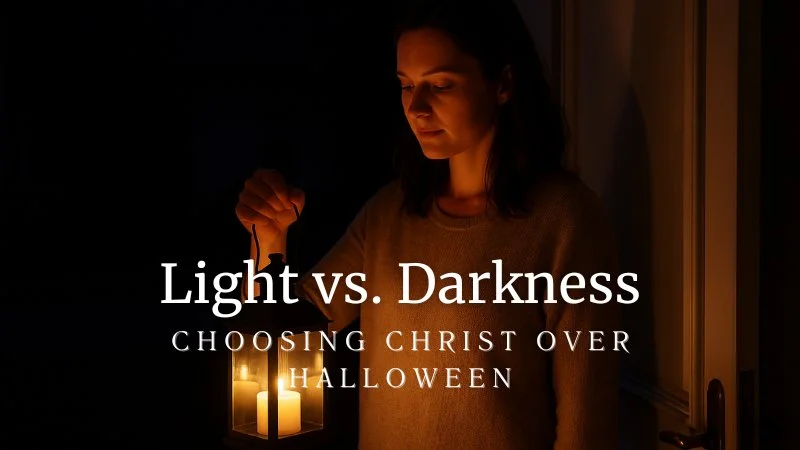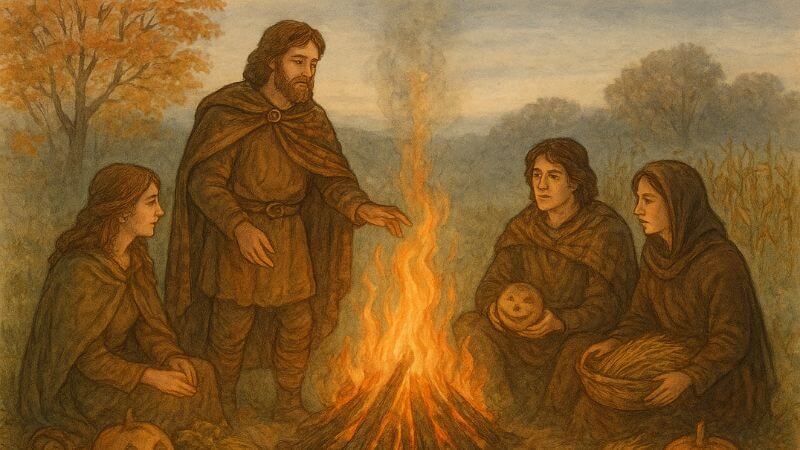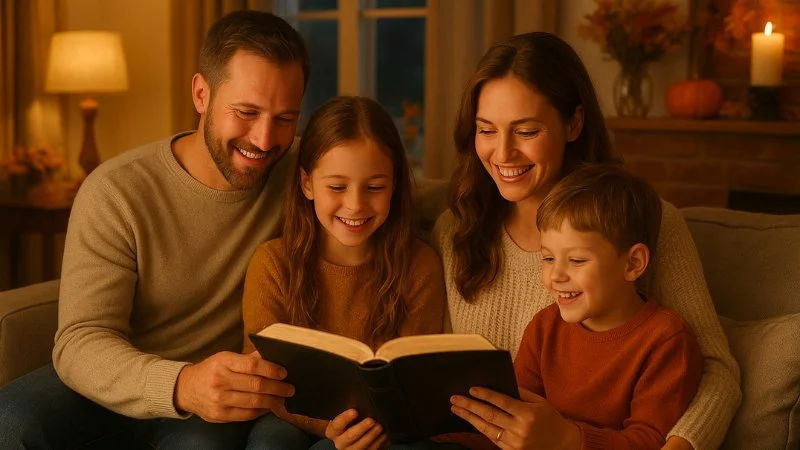
Updated 2025
Every year, as October 31 approaches, the debate resurfaces among believers: Should Christians celebrate Halloween?
Is it harmless fun to dress our kids in cute costumes and let them go trick-or-treating around the neighborhood? What about attending Halloween parties or posting creepy, zombie-like photos on social media just for the sake of joining the trend?
A few years ago, I was scrolling through Facebook when I saw a Christian friend’s profile picture. She had used an app to make herself look like a zombie—bloody mouth, pale skin, and dark eyes. It instantly caught my attention. I couldn’t help but wonder: Does she realize what this celebration truly represents?
I don’t share this to judge anyone. In fact, I once joined Halloween festivities myself when I was a new believer. My boss’s kids loved trick-or-treating, and I went along to make them happy. Back then, I didn’t know any better. I honestly thought it was just a fun, cultural event.
But once I started digging into the origins of Halloween and comparing it with God’s Word, my perspective changed completely.
The Origin of Halloween

The term Halloween comes from “All Hallows’ Eve,” the night before All Saints’ Day. But its roots go much deeper; all the way back to the ancient Celtic festival of Samhain (pronounced “sow-in”).
Samhain marked the end of harvest and the beginning of winter, which the Celts associated with death. They believed that on October 31, the boundary between the living and the dead was blurred. Spirits were thought to roam the earth, visiting their families or causing trouble.
To protect themselves, villagers wore frightening costumes to scare away these wandering spirits and left food offerings on their doorsteps to appease them.
Today, Halloween may seem far removed from those pagan practices, but its core themes: death, fear, and the supernatural, remain. And while it’s often marketed as harmless fun, the spiritual roots behind it tell a different story.
Should Christians Celebrate Halloween?
Many people, including some Christians, see Halloween as innocent entertainment; a night for candy, laughter, and creativity. But when we look at it through a biblical lens, we need to ask: Does this celebration glorify God?
After studying its origins and meaning, I became convinced that Halloween is not just a cultural event. It’s a spiritual one, and not the kind we should participate in.
Here are five reasons why I believe Christians should not celebrate Halloween.
1️⃣ Halloween Celebrates Death, But We Celebrate Life
October 31 is widely known as the “Festival of the Dead.” It symbolizes the transition from life to death, a stark contrast to what the Gospel stands for.
Jesus said in John 5:24, “Whoever hears my word and believes him who sent me has eternal life and will not be judged but has crossed over from death to life.”
As believers, we were once dead in sin, but God made us alive in Christ (Ephesians 2:1). We now walk in newness of life, not death (Romans 6:23).
If God rescued us from darkness into His marvelous light, why would we celebrate something that glorifies death?
We should be celebrating salvation, rejoicing every time a sinner turns from death to life, just as the angels in heaven do (Luke 15:10).
2️⃣ Halloween Is Deeply Connected to Witchcraft and the Occult
What many people don’t realize is that Halloween is one of the highest holy days for Wiccans: those who practice witchcraft. It’s a time for rituals, divination, and attempts to communicate with the dead.
Scripture clearly condemns these practices:
“Let no one be found among you who… practices divination or sorcery, interprets omens, engages in witchcraft, or casts spells…” — Deuteronomy 18:10-12
God calls these things detestable. Yet, on Halloween, they’re often celebrated, even glamorized. When Christians participate, even in small ways, we risk blurring the line between light and darkness.
We can’t glorify God while imitating practices rooted in the occult. As 2 Corinthians 6:14 reminds us, “What fellowship can light have with darkness?”
3️⃣ Halloween Promotes Darkness and Fear
Before I came to know Christ, I was terrified of the dark, especially after my father passed away. For weeks, I couldn’t walk outside at night without a flashlight, afraid I might see a ghost.
But when Jesus came into my life, that fear vanished. I realized that God is always with me. His perfect love casts out fear (1 John 4:18).

Fear is not from God. “For God has not given us a spirit of fear, but of power and of love and of a sound mind” (2 Timothy 1:7).
So why would I, or any believer, participate in a celebration that thrives on fear and darkness?
Romans 13:12 tells us, “The night is far gone; the day is at hand. So then let us cast off the works of darkness and put on the armor of light.”
If we belong to the light, we should live as children of the light, not imitate the works of darkness.
4️⃣ The Tradition of Costumes and Treats Has Pagan Roots
Ever wondered why children dress up in costumes and go door-to-door asking for treats?
In ancient times, villagers disguised themselves as spirits to avoid being recognized and harmed by real ones. They also left out food and sweets to “appease” the spirits, hoping their homes and crops wouldn’t be destroyed.
Over time, this practice evolved into modern trick-or-treating. But its spiritual roots remain.
As Christian parents, we need to ask ourselves: Is it pleasing to God when our children dress up as witches, devils, or ghosts — even just for fun?
We are called to raise our children in the truth, not in traditions that glorify darkness.
5️⃣ The Meaning Behind the Jack-o’-Lantern
The famous carved pumpkin, or “Jack-o’-lantern,” comes from pagan rituals. People carved scary faces into turnips or pumpkins and placed candles inside to ward off evil spirits or guide lost souls.
But as believers, we know that evil spirits are not scared of pumpkins; they flee at the name of Jesus.
Lighting a pumpkin won’t drive away darkness; only Christ, the Light of the World, can do that (John 8:12).
What Should Christians Do Instead?
When we choose not to participate in Halloween, it’s not because we’re uptight or judgmental. It’s because we want to honor God above culture.
Romans 12:2 reminds us, “Do not conform to the pattern of this world, but be transformed by the renewing of your mind.”
We live in this world, but we are not of it (Philippians 3:20).
Anton LaVey, founder of the Church of Satan, once said,
“I’m glad that Christian parents let their children worship the devil at least one night out of the year.”
That statement alone should make every believer pause.
So when children come to your door on Halloween night, you don’t have to hide in the dark or pretend you’re not home. Instead, open your door and shine your light. Give them Gospel tracts, or better yet, share about Jesus.
Remember what Jesus said in Matthew 5:14-16:
“You are the light of the world. A city set on a hill cannot be hidden… Let your light shine before others, that they may see your good deeds and glorify your Father in heaven.”
Final Thoughts: Choosing Light Over Darkness

I know how hard it can be when everyone around you seems to be celebrating. You don’t want your kids to feel left out, and you don’t want to be labeled “too religious.” I’ve been there.
But standing for truth is never easy. As followers of Christ, we are called to live differently: to reflect His light in a dark world.
So this year, instead of celebrating Halloween, celebrate life. Celebrate Jesus.
Let your home be filled with joy, worship, and gratitude. Host a family devotion night. Bake cookies, sing praises, or share stories of how God has brought you from darkness into His marvelous light.
Because in the end, our goal isn’t to fit in with the world but to glorify the One who saved us.
Key Takeaway:
Christians are called to reject darkness and walk in the light of Christ. Halloween glorifies fear, death, and evil; everything Jesus came to conquer.
Let’s use this day not to blend in, but to boldly shine for Him.

Growing up in a Christian household, we never celebrated Halloween, and as a child, I didn’t always understand why.
But as I got older and started learning more about the spiritual roots of the holiday, I came to appreciate my parents’ decision. Your article captures so well the deeper truth behind what seems like “harmless fun.”
Halloween may be packaged as a cultural event today, but its themes of darkness, death, and fear stand in direct contrast to what Christians believe.
Thank you for sharing your experience, Jenny! It’s so encouraging to hear from someone who went through that journey of understanding.
You’re exactly right; it can be a challenge for kids to understand the ‘why,’ but gaining that deeper appreciation for the spiritual roots as an adult is a powerful testament.
I completely agree: no matter how it’s packaged, the core themes are fundamentally at odds with the hope and light of the Christian faith. Your comment truly validates the message!
Hi!
I could have sworn I’ve been to this blog before but after browsing through some of the post I realized it’s new to me.
Nonetheless, I’m definitely delighted I found it and I’ll be bookmarking and checking back often!
Thank you for visiting, Pam.
Please return to check out our new articles.
Thank you for this well-written article.
Shalom Esther, thanks for visiting.
Halloween maybe fun because of the “trick-or-treat” but Christians should know better than to celebrate this day which goes against the Word of God. Year after year when this day arrives, we need to be reminded that this is not something we want to participate in as followers of Christ.
I just hope that Christians who are still getting involved in this act of abomination against God will be enlightened.
Blessings to you!
Wow, thank you for your comprehensive post on explaining the origins of Halloween.
I personally have not celebrated it but now having a kid there is almost ‘peer pressure’ to join in the festival since its so big.
Knowing the origins, I am now absolutely convinced we will not be participating in Halloween. Instead we were at our church’s under the sea party, dressed as sea creatures.
Halloween just like Christmas has become too secularized in that even Christians no longer see the danger in celebrating and participating in it. Many are still being deceived into thinking that they can actually celebrate it with a clear conscience. Many Christians are still unaware how demonic Halloween celebration is.
But shouldn’t we take the time to know if what we’re celebrating edifies other believers and gives glory to God? Even kids are being pressured to join in. Instead of joining the Halloween Celebration, we can use this holiday to do other stuff that gives glory to God.
I think having an under the sea party sounds like a fun way to spend this holiday. Thanks for coming by SJ, God bless!
Well, I can’t comment about whether celebrating Halloween is right or wrong, I mean everyone has their own beliefs and everyone should be able to practice their beliefs unless they’re crossing the borders of other people, but I totally am sure that it’s a new age money making machine and that’s why it’s so popularized.
I mean all the days that actually meant something are completely empty now thanks to the industry of money making.
Hey Tyler,
You’re right, we all have the freedom to believe what we want to believe and to act on them for as long as we’re not stepping on other people’s toes. I totally get that and I often hear that too.
But as Bible-believing Christians, we have to be able to make a distinction between the things and deeds that glorify God and those that do not. The apostle Paul talks about the believer’s freedom in 1 Corinthians 10:23 when he said that although all things are permissible, not all things are helpful/beneficial and not all things edify. I say, by all means let use our freedom to glorify God and edify our fellow brethren.
The Bible couldn’t be any clearer when it calls the pagan practices associated with Halloween as detestable and are an abomination to the Lord.